You are here: Foswiki>Dmi Web>WinterSchool2019 (10 Mar 2019, BernhardRieder)Edit Attach
Post-truth Empiricism: On the new epistemologies and research affordances of social media
Digital Methods Winter School and Data Sprint 2019
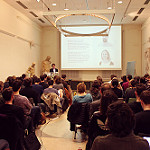
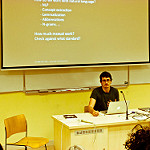
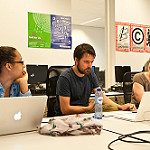
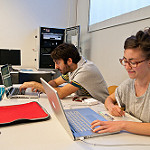
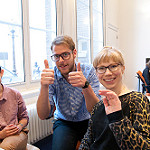
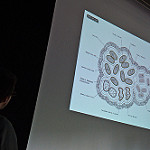
Digital Methods Winter School and Data Sprint 2019
7–11 January 2019
Projects
Important Links
| Shortlink | Description |
| bit.ly/dmi19-ws-call | Call for participation and general information. |
| bit.ly/dmi19-ws-welcomepack bit.ly/dmi19-ws-welcomepack-folder | The main welcome package document. Contents: Welcome note, day-to-day schedule, maps of venue locations, coffee, and lunch places, preparations, and further instructions. The welcome package folder has the reader, face book, and other linked documents. |
| bit.ly/dmi19-ws-coffee-lunch | Map of coffee and lunch places. |
| bit.ly/dmi19-ws-projects | Tentative descriptions of projects to be pitched on the opening day (Monday afternoon). |
| bit.ly/dmi19-ws-reader bit.ly/dmi19-ws-reader-folder | The reader and a reader folder with PDF documents. |
| bit.ly/dmi19-ws-tutorials-form | The form to sign up to tutorials |
| bit.ly/dmi19-ws-venues | Map of Winter School principal locations. |
| bit.ly/dmi19-ws-template-gdoc bit.ly/dmi19-ws-template-wiki | The templates to be used for writing up research project reports. Formats: Google Docs and DMI Wiki (please find further instructions of use in the main welcome package document.) |
| bit.ly/dmi19-ws-notes | The collaborative note-taking document that we will use for keynotes on the opening days (Mondays). |
| #dmi19 | Official Twitter hashtag. |
Digital Methods Winter School and Data Sprint
The Digital Methods Initiative (DMI), Amsterdam, is holding its annual Winter School on 'Post-truth empiricism: On the new epistemologies and research affordances of social media.' The format is that of a (social media and web) data sprint, with tutorials as well as hands-on work for telling stories with data. There is a programme of keynote speakers, including Whitney Phillips and Steve Fuller, as well as a book launch of 'Spotify Teardown' (MIT Press, 2018). It is intended for advanced Master's students, PhD candidates and motivated scholars who would like to work on (and complete) a digital methods project in an intensive workshop setting. For a preview of what the event is like, you can view short video clips from previous editions of the Summer School. Nearing two years on from the scandal of fake news, web epistemology has changed irrevocably. Social media platforms have been revealed as primary vectors for rumour-mongering and conspiracy theory, and Facebook in particular (and Instagram before it) are shutting down access to data (through APIs) or deleting it, without committing it to public archives. As researchers we are compelled to rethink how we study these platforms. One conceptual response, the post-digital, became a forceful rejoinder to any naiveté about ‘new media’ and its playful study, left over after the Snowden revelations of widespread digital surveillance by governmental agencies. Another response, post-truth, concerns the new state of epistemological affairs online, a realisation that ‘we can’t have our facts back,’ as Noortje Marres phrased it, for social media — not to mention much of the non-editorial web that preceded it — are ’truthless’ media. The web has long been conceived of as a medium of ill repute, populated by pirates, pornographers and self-publishers, later to be cleaned up by folksonomy and sifted through by the wisdom of the crowd. Where are those mass editing publics these days? Have they really been replaced by small fact-checking bureaus? This year’s Winter School is dedicated to the broad post-truth problematic, not only conceptually but empirically. How are online media being adjudicated? Previous work has examined genres of misinformation, their spread as well as detection, comparing them across platforms. Conspiracy (complicated emplotments) was found to flourish on the web, but well detected on Facebook, but the opposite held for disinformation (hard facts inverted). The ontological work of identifying and classifying post-truth continues. One ‘so what’ question that persists since the beginning of the post-truth period concerns whether these content consumers are persuaded. Are they ‘communities of believers’ or ‘active filtering audiences’? Another crucial question concerns the availability of online materials, once considered ‘big data’ but now difficult to access without scraping or other ill-gotten means. Are there materials, or perhaps remnants, still available for study? At last year’s Winter School researchers built an archive of the traces from some 88 Russian disinformation pages that had been pushed onto other platforms, and are available for study. There are homemade collections, some rather large. One is a Twitter archive put out for public use by a US news agency. Facebook’s Social Science One project also should be interrogated for the lengths researchers would go for Facebook-sanctioned data (and what kinds of research may be performed with it). Of interest as well are the relatively understudied platforms such as YouTube’s so-called dark intellectual web, the ‘manosphere’ in Reddit as well as fringe platforms such as 4chan, gab.ai, voat, etc. At the Winter School there are the usual social media tool tutorials (and the occasional tool requiem), but also invitations for thinking through and proposing how to work on web epistemology after the fake news debacle. New tutorials include digital ethnography, data journalism and small data work, plus a new variation on the walk-through method.References
- Marres, N. (2018). 'Why We Can't Have Our Facts Back,' Engaging Science, Technology, and Society 4, 423-443.
- Rogers, R. (2018). 'Social Media Research after the Fake News Debacle,' Partecipazione e Conflitto 11(2), 557-570.
Applications: Key Dates
The deadline for application is 26 November 2018. To apply please enter on the secure website a letter of motivation, your CV (including postal address), a headshot photo, 100-word bio as well as a copy of your passport (details page only). Alternatively you may send those materials along to winterschool [at] digitalmethods.net. Notifications of acceptance will be sent on 27 November. The full program and schedule of the Winter School are available on 19 December 2018.Tuition Fees, Accommodations & Completion Certificates
The fee for the Digital Methods Winter School 2019 is EUR 595, and upon completion all participants receive certificates (and 6 ECTS). To complete the Winter School successfully all participants must co-present the final presentation and co-author the final project report, evidenced by the presentation slides as well as the final report itself. Bank transfer information is sent along with the notification on 27 November 2018. Participants must pay the fee by 5 January 2019. Students at the University of Amsterdam do not pay fees. Participants from LERU as well as U21 universities receive a tuition waiver of EUR 500. Dutch universities in LERU and U21 unfortunately are unable to receive the tuition waiver. The Winter School is self-catered. The venue is in the center of Amsterdam with abundant coffee houses and lunch places. Participants are expected to find their own housing (airbnb and other short-stay sites are helpful), or we have available accommodations at the Student Hotel: The Student Hotel AmsterdamJan van Galenstraat 335
1061 AZ Amsterdam, The Netherlands
Tel: +31 20 760 4000
(Arrival: 6 January 2019; Departure: 12 January 2019)
https://www.thestudenthotel.com/amsterdam-west
reservations [at] thestudenthotel.com or tel. +31 20 760 7575
If you would like to have accommodations at the Student Hotel, please write to the student hotel directly. To avoid disappointment, please write to them as early as possible. Ask the hotel for the 15% Digital Methods Winter School discount. The Winter School closes on Friday with a festive event, after the final presentations. Here is a guide to the Amsterdam new media scene. For further questions, please contact the local organizers, at winterschool [at] digitalmethods.net. Please bring your laptop computer, your European plug as well as the VGA adaptor for connecting to the projector.
About DMI
The Digital Methods Winter School is part of the Digital Methods Initiative (DMI), Amsterdam, dedicated to developing methods for Internet-related research and the study of the natively digital. The Digital Methods Initiative holds the annual Digital Methods Summer Schools (twelve to date), which are intensive and full-time, 2-week undertakings in the Summertime. The next Summer School will take place from 1–12 July 2019. The Digital Methods book (MIT Press, 2015) provides an introduction to the methodological outlook that frames and informs the work of the DMI. This is accompanied by a companion volume about mapping social and political issues with digital methods: Issue Mapping for an Ageing Europe (Amsterdam University Press, 2015), which is also freely available on the web as an open access monograph. Further information and resources about digital methods can be found at digitalmethods.net - including links to example projects, publications, tools, an introductory "founding narrative" about the Digital Methods Initiative as well as short bios of the affiliated researchers. Upcoming is a practical textbook, Doing Digital Methods (Sage, 2019). The coordinators of the Digital Methods Initiative are Dr. Sabine Niederer (Amsterdam University of Applied Sciences) and Dr. Esther Weltevrede (New Media & Digital Culture, University of Amsterdam), and the director is Richard Rogers, Professor of New Media & Digital Culture, University of Amsterdam.About Digital Methods as a Concept
Digital methods is a term coined as a counterpoint to virtual methods, which typically digitize existing methods and port them onto the Web. Digital methods, contrariwise, seek to learn from the methods built into the dominant devices online, and repurpose them for social and cultural research. That is, the challenge is to study both the info-web as well as the social web with the tools that organize them. There is a general protocol to digital methods. At the outset stock is taken of the natively digital objects that are available (links, tags, threads, etc.) and how devices such as search engines make use of them. Can the device techniques be repurposed, for example by remixing the digital objects they take as inputs? Once findings are made with online data, where to ground them? Is the baseline still the offline, or are findings to be grounded in more online data? See R. Rogers (2009), The End of the Virtual: Digital Methods. Amsterdam: Amsterdam University Press.Social
We are using the #DMI19 hashtag as the backchannel for communication (to use a throwback term for Twitter usage). Some pictures from Winter School 2015. Here is the Facebook Group from one year, and from the last Summer School. Here are pictures from a variety of DMI Summer and Winter School flickr streams.Edit | Attach | Print version | History: r30 < r29 < r28 < r27 | Backlinks | View wiki text | Edit wiki text | More topic actions
Topic revision: r30 - 10 Mar 2019, BernhardRieder
 Copyright © by the contributing authors. All material on this collaboration platform is the property of the contributing authors.
Copyright © by the contributing authors. All material on this collaboration platform is the property of the contributing authors. Ideas, requests, problems regarding Foswiki? Send feedback
